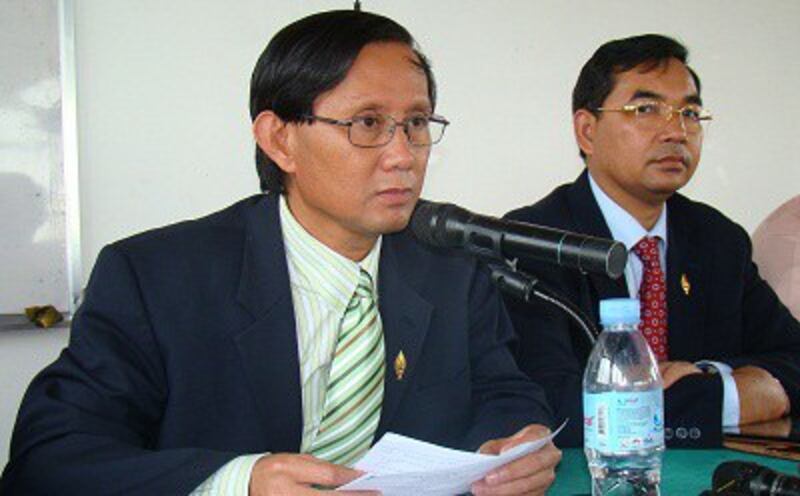Cambodia’s Ministry of the Interior on Thursday rejected proposals by opposition parties to reform the country’s electoral body, saying the people see “no problem” with the voting process despite U.N. claims that there are “major flaws” in the administration of elections.
The rejection was met with protests by the opposition Sam Rainsy Party (SRP) and the Human Rights Party (HRP) which may boycott an upcoming 2013 vote, an SRP spokesman said.
Leaders of the two parties met with Prum Sokha, Secretary of State of the Ministry of the Interior, in the capital Phnom Penh to urge him to reform the National Election Committee ahead of the July vote.
Speaking at a press conference after their two-hour talks, Prum Sokha said any reform of the election committee could raise security concerns and added that the Cambodian people see no need for change to the way polls were conducted.
“The opposition parties’ requests will pose a threat to national security. So far voters have said there is no problem with the electoral process,” he said, with providing details of the security concerns.
He said the ministry has enacted a series of reforms to make the National Election Committee more efficient since 1998 and that further reforms are not necessary.
The committee, which organizes and manages polls, has been accused by rights groups and opposition parties of bias toward the ruling Cambodian People’s Party (CPP), which has ruled the country for three decades.
The opposition parties have been calling for independent members on the National Election Committee, whose headquarters is situated in the Ministry of the Interior compound.
The committee had wanted to move of the compound to reflect its independence but the government has said there is no budget to relocate its premises, according to reports.
The CPP easily won commune-level elections in 2002, 2007, and 2012 amid political violence and other problems.
At the 2012 commune-level election in June, opposition parties and election monitoring groups complained of widespread irregularities in voter registration lists and increased intimidation of voters.

Boycott
The SRP and HRP, the country’s two largest opposition parties, are planning a merger that will allow them to join forces in the 2013 vote against the CPP’s Hun Sen, who has been the country’s prime minister since 1998.
But following their meeting with Prum Sokha, the parties are considering boycotting the vote if the ministry fails to enact reforms, SRP spokesman Yim Sovann said.
“Voters and the international community don’t trust the National Election Committee. We need to reform the National Election Committee,” he said, speaking at a separate press conference on Thursday.
He added that a reform will allow people to trust the election body and will reduce election disputes.
U.N. Special Rapporteur
A month ago, Surya Subedi, the U.N. Special Rapporteur for human rights in Cambodia, warned in report that the country could plunge into violence if it does not reform the current system to allow free and fair elections.
The report to the U.N. detailed "major flaws" in the administration of elections in Cambodia and called for "urgent and longer-term reforms" to give citizens confidence in the electoral process and in the committee.
His recommendations included ensuring the committee independent and autonomous status in the constitutional and legal structure of Cambodia, creating a new tribunal body to resolve election-related disputes, and ensuring all political parties have fair access to the mass media to convey their messages to the electorate.
Subedi also called for a "political solution" to enable exiled SRP leader and former Cambodian lawmaker Sam Rainsy to return to Cambodia "to play a full role" in politics.
Sam Rainsy went into exile in 2009 after leading a border protest and was convicted in absentia for incitement and damaging property, charges he claims are groundless and politically motivated.
Reported by Sok Serey for RFA’s Khmer service. Translated by Samean Yun. Written in English by Rachel Vandenbrink.
